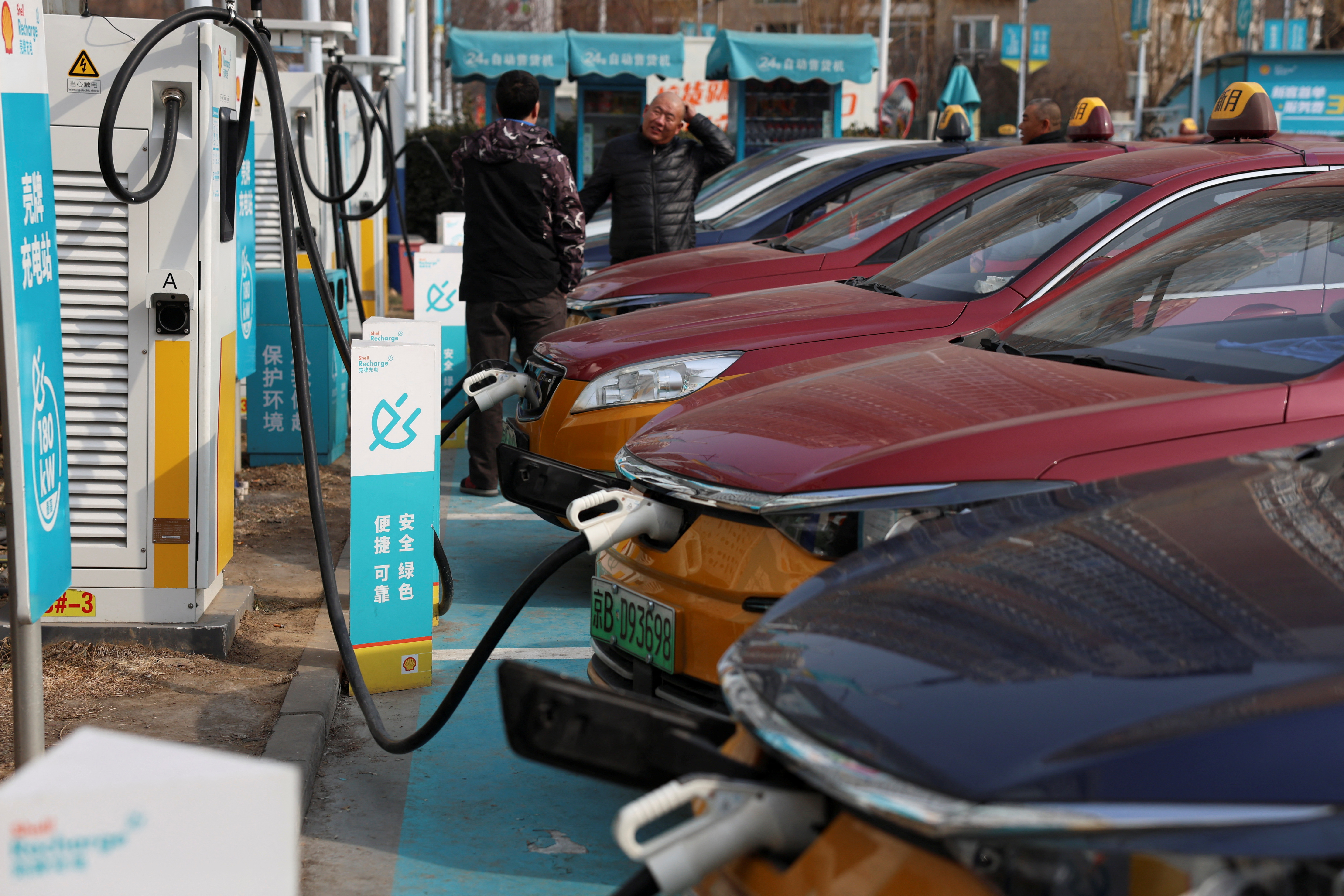
WASHINGTON, May 14 (Reuters) - U.S. President Joe Biden on Tuesday unveiled a bundle of steep tariff increases on an array of Chinese imports including electric vehicle (EV) batteries, computer chips and medical products, risking an election-year standoff with Beijing in a bid to woo voters who give his economic policies low marks.
China immediately vowed retaliation. Its commerce ministry said Beijing was opposed to the U.S. tariff hikes and would take measures to defend its interests, urging the United States to cancel the measures.
Biden will keep tariffs put in place by his Republican predecessor Donald Trump while ratcheting up others, including a quadrupling of EV duties to over 100% and doubling the duties on semiconductor tariffs to 50%, the White House said in a statement. It cited "unacceptable risks" to U.S. economic security posed by what it considers unfair Chinese practices that are flooding global markets with cheap goods.
The new measures affect $18 billion in imported Chinese goods including steel and aluminum, semiconductors, electric vehicles, critical minerals, solar cells and cranes, the White House said.
The United States imported $427 billion in goods from China in 2023 and exported $148 billion to the world's No. 2 economy, according to the U.S. Census Bureau, a trade gap that has persisted for decades and become an ever more sensitive subject in Washington.
"China's using the same playbook it has before to power its own growth at the expense of others by continuing to invest, despite excess Chinese capacity and flooding global markets with exports that are underpriced due to unfair practices," Biden economic adviser Lael Brainard told reporters on a conference call.
U.S. Trade Representative Katherine Tai said the revised tariffs were justified because China was stealing U.S. intellectual property. But Tai recommended tariff exclusions, for hundreds of industrial machinery import categories from China, including 19 for solar product manufacturing equipment.
Financial market reaction was muted. U.S. stock index futures were little changed. The announcement came after Chinese markets closed for the day, but in U.S. premarket trading shares of Chinese EV makers Li Auto and Xpeng were around 3% lower. Treasury yields were fairly flat, suggesting little worry that the move would aggravate U.S. consumer price pressures.
FREE TRADE NO MORE
Even as Biden's steps fell in line with Trump's premise that tougher trade measures are warranted, the Democrat took aim at his opponent in November's election.
The White House said Trump's 2020 trade deal with China did not increase American exports or boost American manufacturing jobs, and it said the 10% across-the-board tariffs on goods from all points of origin that Trump has proposed would frustrate U.S. allies and raise prices. Trump has floated tariffs of 60% or higher on all Chinese goods.
Administration officials said their measures are "carefully targeted," combined with domestic investment, plotted with close allies and unlikely to worsen a bout of inflation that has already angered U.S. voters and imperiled Biden's re-election bid.
Biden has struggled to convince voters of the efficacy of his economic policies despite a backdrop of low unemployment and above-trend economic growth. A Reuters/Ipsos poll last month showed Trump had a 7 percentage-point edge over Biden on the economy.
Analysts have warned that a trade tiff could raise costs for EVs overall, hurting Biden's climate goals and his aim to create manufacturing jobs.
Biden has said he wants to win this era of competition with China but not to launch a trade war. He has worked in recent months to ease tensions in one-on-one talks with Chinese President Xi Jinping.
Both 2024 U.S. presidential candidates have departed from the free-trade consensus that once reigned in Washington, a period capped by China's joining the World Trade Organization in 2001. Trump's broader imposition of tariffs during his 2017-2021 presidency kicked off a tariff war with China.
As part of the long-awaited tariff update, Biden will increase tariffs this year under Section 301 of the Trade Act of 1974 from 25% to 100% on EVs, bringing total duties to 102.5%, from 7.5% to 25% on lithium-ion EV batteries and other battery parts and from 25% to 50% on photovoltaic cells used to make solar panels. Some critical minerals will have their tariffs raised from nothing to 25%.
The tariffs on ship-to-shore cranes will rise to 25% from zero, those on syringes and needles will rise to 50% from nothing now and some personal protective equipment (PPE) used in medical facilities will rise to 25% from as little as 0% now. Shortages in PPE made largely in China hampered the United States' COVID-19 response.
More tariffs will follow in 2025 and 2026 on semiconductors, as well as lithium-ion batteries that are not used in electric vehicles, graphite and permanent magnets as well as rubber medical and surgical gloves.
A step Biden previously announced to raise tariffs on some steel and aluminum products will take effect this year, the White House said.
A number of lawmakers have called for massive hikes on Chinese vehicle tariffs or an outright ban over data privacy concerns. There are relatively few Chinese-made light-duty vehicles being imported now.
The United Auto Workers, a politically important union that endorsed Biden, said the tariff moves would ensure that "the transition to electric vehicles is a just transition."


